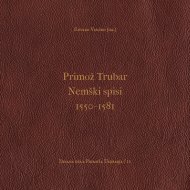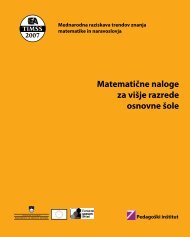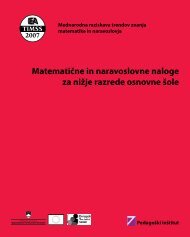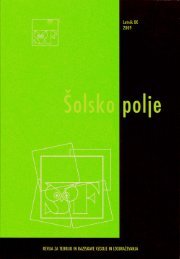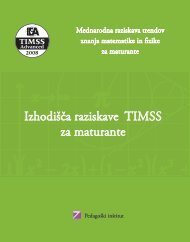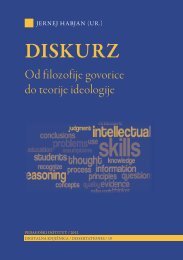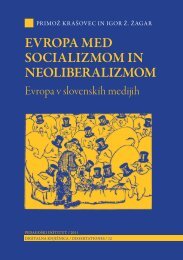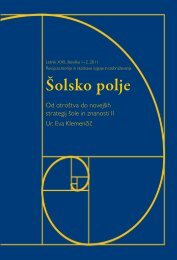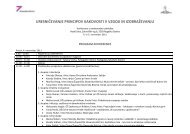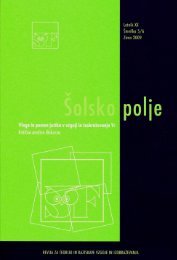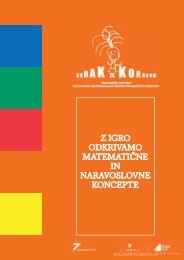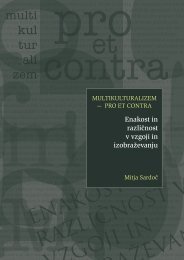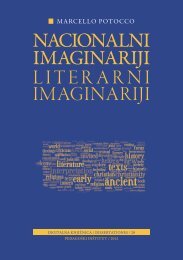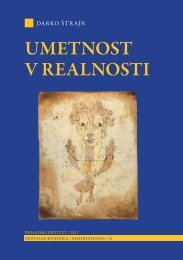1. PDF dokument (3365 kB) - dLib.si
1. PDF dokument (3365 kB) - dLib.si
1. PDF dokument (3365 kB) - dLib.si
- No tags were found...
You also want an ePaper? Increase the reach of your titles
YUMPU automatically turns print PDFs into web optimized ePapers that Google loves.
208Šolsko polje, letnik XXI, številka 5– 6Multicultural interactions and the dictatorship oftolerance: The case of ChinaThe article deals with problems related to the concept of tolerance inthe context of multicultural interactions. It draws attention to the concreteproblems associated with the application of this concept within the frameworkof ba<strong>si</strong>c human rights against the social and political background oftraditional and modern China. The author empha<strong>si</strong>zes the relativity and thecultural conditionality of these supposedly universal values through criticalanaly<strong>si</strong>s of such examples. Thus, the article shows that the notion of tolerancecannot be separated from the scope of ideological and axiological connotationswhich are characteristic for Western societies and their ideologicalapparatuses. Suchlike concepts of tolerance have been advocated by thedefenders of pluralism and liberalism. It is therefore of utmost importancein modern globalized societies that are confronted with multicultural issuesnot to deal with questions of migration, exile or hibridity as though appearingin a <strong>si</strong>mple contradiction to nation, rootedness and authenticity, but tolocate and evaluate their ideological, political and emotional links and theircross-sections within multilayered postcolonial histories.Key words: postcolonial studies, multiculturalism, tolerance critique,universality, human rightsLilijana BurcarMultikulturalizem in diskurz tolerance v dobi globalnegakapitalizma in neora<strong>si</strong>zmaČlanek pod drobnogled postavlja multikulturno politiko evro-atlantskihdržav ter spremljajoči diskurz tolerance, izpostavljajoč njuno vlogo priopravičevanju in naturalizaciji novih oblik marginalizacije in izključevanjatistih, ki jih ta politika postavlja za ra<strong>si</strong>alizirane druge. Pri tem pokaže, da jeza institucionalni multikulturalizem evro-atlantskih držav značilno, da podprevleko tolerance in liberalne pluralnosti promovira le <strong>si</strong>mbolično vključitevetnizirano označenega drugega, saj je ta hkrati poustvarjen za kulturnospecifičnega in omejenega s strani kulture ter na ta način iz njenega jedra izvržen.Tvorno in določujoče družbeno središče evro-atlantskih skupnosti jetako še naprej zamišljeno izključno kot belsko; to pa je slikano kot razbremenjenokakršnekoli ukalupljenosti s strani kulture, saj je ta v primeru neetniziranegadrugega preosmišljena zgolj kot vrsta proste izbire. Izraz multikulturense zato nanaša izključno na etnizirane druge, kar priča tako o selektivnikot esencialistični rabi pojma kulture znotraj navidezno nevtralnega govorao multikulturni pestrosti in raznolikosti Zahoda. Poudarek na institucio-



